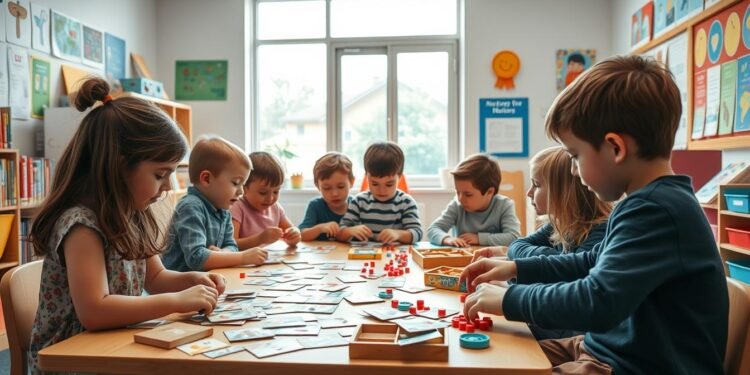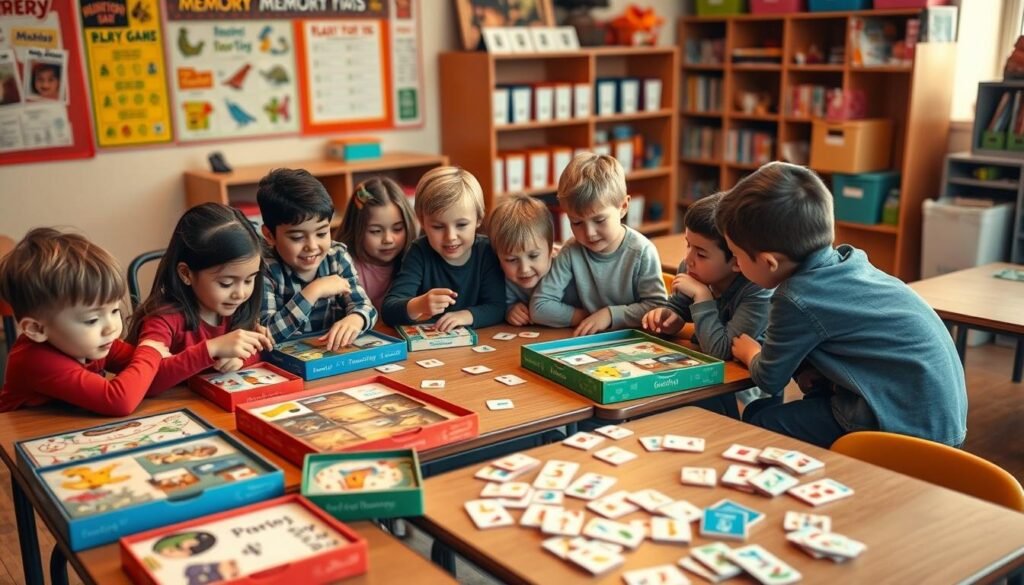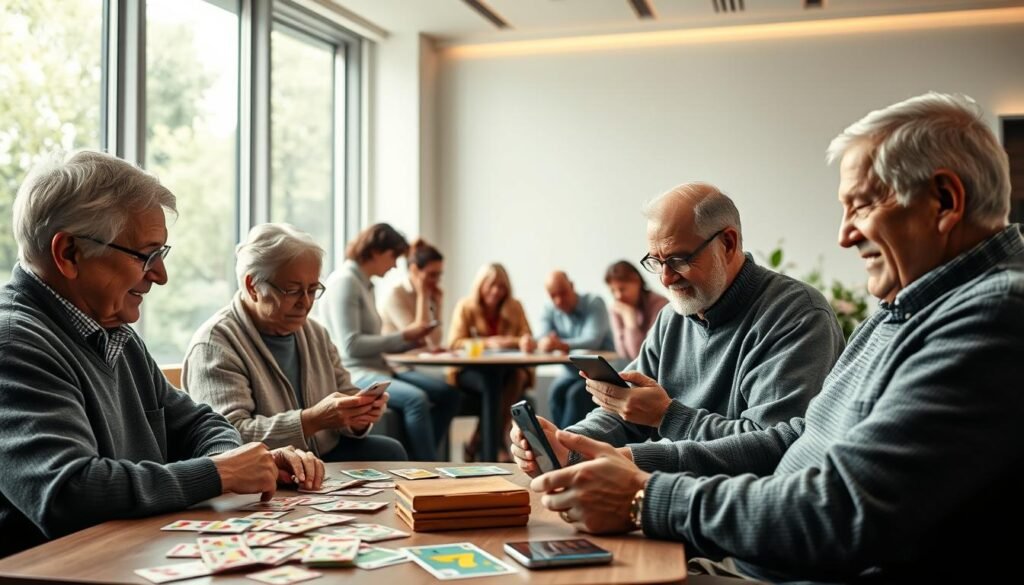Have you ever wondered how to boost focus and cognitive skills in just five minutes? In today’s fast-paced world, quick, effective activities are essential for enhancing concentration and mental agility. Whether in the classroom or at home, these short exercises can make a big difference.
Neuroscience studies show that brief, focused tasks can improve brain plasticity and sharpen short-term recall. These activities are designed to fit seamlessly into busy schedules, requiring no special tools—just everyday items like cards or trays. They’re perfect for transitions between lessons or quick breaks during homework.
These 10 curated activities are adaptable for all ages, from elementary to high school. They align with Common Core standards, supporting executive functioning skills while being fun and engaging. Ready to explore how these simple yet powerful exercises can transform learning and focus? Let’s dive in!
Key Takeaways
- Quick cognitive exercises enhance focus and mental agility.
- Short activities improve brain plasticity and recall.
- No-prep games use everyday items for convenience.
- Adaptable for all ages, from K-12 students.
- Aligns with Common Core standards for skill development.
Why Memory Games Are Essential for Students
What makes quick cognitive exercises so impactful for mental sharpness? Research shows that these activities activate key areas of the brain, such as the hippocampus, which is crucial for spatial and working memory. Studies like Nickerson & Adams 1979 highlight how long-term object recall improves with consistent practice.
Paivio’s concreteness theory further explains why visual and tangible tasks enhance word recall. This is why activities like the “Everyday Memory Challenge” are so effective—they rely on context-dependent learning, making information easier to retain.
The Science Behind Memory and Learning
MRI scans reveal that engaging in these exercises increases gray matter in the brain. This growth is linked to better attention and faster processing speed. For example, a six-week program showed a 34% improvement in math fact recall among participants.
Neurotransmitters like dopamine also play a role. They boost motivation and make these activities enjoyable, ensuring consistent participation. This is why gamification leads to a 30% boost in knowledge retention, as noted in recent studies.
Benefits of Memory Games for Cognitive Development
These exercises strengthen five key cognitive domains: attention, processing speed, problem-solving, creativity, and memory skills. Unlike rote memorization, they encourage active recall, which is more effective for long-term retention.
OECD reports even link these activities to higher PISA scores, proving their educational value. They’re not just recreational—they’re powerful tools for brain training and skill development.
Top 10 Memory Games for Students
Boost cognitive skills with these engaging and easy-to-implement exercises. Designed to fit into any schedule, these activities are perfect for enhancing short-term memory and focus. Whether in class or at home, they’re a fun way to sharpen mental agility.
1. Simon Says Memory Game
This classic activity is a great way to improve concentration. Studies show that adding sound increases recall by 68%. Use simple commands to challenge recall and attention.
2. Face Memory Test
Adapted from FBI training, this game uses a 5-second exposure to faces. It’s excellent for enhancing visual recall and attention to detail.
3. Now You See It, Now You Don’t
Place 10-20 items on an 18″x24″ tray. Give participants one minute to view, then remove an item. This exercise sharpens short-term memory and observation skills.
4. What’s Missing?
Remove three items from a group and ask participants to identify the missing ones. This activity has a 72% success rate among third graders, making it both fun and effective.
5. Who’s Missing?
Perfect for field trips, this game involves recalling absent individuals. It’s a practical way to improve recall in real-world scenarios.
6. Classroom Mix-up
Rearrange objects in a room and ask participants to recall their original positions. A case study showed 14 out of 20 objects were correctly remembered.
7. Everyday Memory Challenge
Use a grocery list to practice the chain method. This technique links items together, making them easier to remember.
8. Eyewitness Game
Incorporate the DOJ’s misinformation effect statistics. This activity highlights how easily details can be misremembered, improving critical thinking.
9. False Memories Experiment
Use word lists to demonstrate how false memories can form. Studies show a 40% error rate, making this a fascinating exploration of recall.
10. Concentration Card Game
Use pairs of cards to match multiplication problems with their answers. This math variant adds an educational twist to a classic memory game.
How to Implement Memory Games in the Classroom
Looking for ways to make learning more interactive and effective in the classroom? These quick activities can transform your teaching approach. They’re designed to fit seamlessly into your schedule, requiring minimal preparation but delivering maximum impact.
Setting Up the Games
Start by laminating cards for durability. This small investment ensures they can be reused over 200 times, costing just $0.03 per use. For activities like the “What’s Missing?” game, use a tray with 10-20 items to challenge observation skills.
Consider spatial planning by organizing group sizes of 4-7 students. This setup encourages collaboration while keeping everyone engaged. For tech-savvy classrooms, blend digital tools like Kahoot! to create modern variants of classic activities.
Tips for Engaging Students
Use the “chunking” technique to help students recall numbers or sequences more easily. Break information into smaller, manageable parts to improve retention. For students with ADHD, integrate IEP modifications like extended time to ensure inclusivity.
Introduce a token economy system, rewarding participants with “memory medals” for their efforts. This approach not only motivates but also fosters a positive learning environment. Cross-curricular links, such as history timeline matching, make these activities even more impactful.
Finally, track progress with a simple rubric to assess recall accuracy. Send home “False Memory” word lists to involve parents and extend learning beyond the classroom. These strategies ensure these exercises are both fun and educational.
Memory Games for Home: Fun and Learning Combined
Bringing fun and learning together at home has never been easier. These activities are designed to engage the whole family while sharpening cognitive skills. Whether it’s after dinner or during a road trip, these exercises turn everyday moments into opportunities for growth.
Creating a Memory Game Routine
Consistency is key when it comes to training the brain. Start with a simple routine, like the “Brain Olympics” at 7 PM after dinner. This daily practice helps build focus and recall over time.
Limit screen time by maintaining a 3:1 ratio of analog to digital activities. Use upcycled materials like cereal box cards for DIY projects. Tracking progress with a 90-medal system keeps everyone motivated and engaged.
Involving the Whole Family
These activities are perfect for intergenerational play. Share stories from Grandpa’s wartime experiences or challenge each other with spice jar smell identification in the kitchen. Road trips become educational with license plate chunking exercises.
Encourage sibling rivalry with weekly championships or add a cultural twist by playing “Loteria” card game variations. Even pets can join in with dog name recall challenges. These activities make learning a shared experience for the whole family.
Memory Games for Different Age Groups
Tailoring activities to specific age groups can maximize learning potential. Each stage of development has unique needs, and adapting exercises ensures better engagement and results. From elementary to high school, these tasks are designed to challenge and inspire.
Games for Elementary Students
For younger kids, activities like animal sound matching focus on auditory skills. These exercises are simple yet effective, helping children build foundational cognitive abilities. Using concrete words and images, as suggested by Paivio’s research, enhances recall and understanding.
Games for Middle School Students
Middle schoolers benefit from tasks like the periodic table Concentration game. This activity combines science with numbers, making learning interactive and fun. Chunking experiments show that breaking information into smaller parts improves retention, especially for this age group.
Games for High School Students
For older students, SAT vocabulary mnemonics games are ideal. These exercises prepare them for academic challenges while sharpening their memory skills. Integrating tools like Quizlet Live adds a tech-savvy twist, keeping teens engaged and motivated.
Memory Games for Different Subjects
How can quick activities enhance learning in math, language arts, and science? These subject-specific exercises are designed to make learning more engaging and effective. By integrating fun tasks into each subject, you can boost understanding and retention in a meaningful way.
Math Memory Games
Math can be challenging, but activities like equation matching make it easier. Studies show this method improves recall by 15-30%. Another great option is the prime number hunt, where participants identify prime numbers from a list. Fraction equivalence tasks also help build a strong foundation in math concepts.
Language Arts Memory Games
Language arts activities focus on improving words and communication skills. Homophone pairs, for example, help learners distinguish between similar-sounding words. Quote completion tasks encourage attention to detail and enhance reading comprehension. These exercises make learning language arts both fun and effective.
Science Memory Games
Science activities like lab equipment matching teach essential skills in a hands-on way. Taxonomy ranks exercises help learners understand classification systems. These tasks not only improve recall but also foster a deeper understanding of scientific concepts. By making science interactive, you can spark curiosity and engagement.
Memory Games for Short-Term Memory Improvement
Improving short-term recall can be both simple and effective with the right techniques. These activities are designed to strengthen attention and boost cognitive performance in just a few minutes. Whether in class or at home, they’re perfect for sharpening mental agility.
Techniques to Enhance Short-Term Memory
One proven method is chunking, which involves breaking information into smaller, manageable parts. For example, phone numbers are often split into groups of three or four digits. This approach aligns with the 7±2 capacity limit, making it easier to retain details.
Mnemonics, like the “Roy G. Biv” method for remembering rainbow colors, also work well. These tools create mental shortcuts, improving recall speed and accuracy. Speed drills, such as 30-second item recall challenges, further test and enhance short-term memory.
Games Focused on Short-Term Memory
Activities like the dual n-back exercise use digital tools to push cognitive limits. This advanced training method improves working memory by requiring participants to recall sequences of increasing complexity. It’s a great way to challenge the brain and track progress.
Background noise experiments based on interference theory show how distractions affect recall. These activities highlight the importance of focus in brain training. For classroom use, summarizing lecture notes in real-time can also strengthen retention and attention to detail.
Finally, nutrition plays a role. Studies link omega-3 intake to better cognitive function. Limiting tech distractions, like notifications, further supports short-term memory improvement. By combining these techniques, you can achieve measurable gains in just four weeks.
Memory Games for Long-Term Memory Retention
Strengthening long-term recall doesn’t have to be time-consuming or complicated. With the right strategies and activities, you can enhance retention and make learning more effective. These methods are backed by science and designed to fit into any routine.
Strategies for Long-Term Memory
One proven technique is spaced repetition, which involves reviewing information at increasing intervals. This method helps solidify knowledge over time. Another effective strategy is elaborative rehearsal, where you create stories or associations to make information more memorable.
Semantic encoding, which focuses on the meaning of information, also improves long-term memory. For example, linking new concepts to familiar ideas can make them easier to recall. Sleep consolidation is another key factor—playing these activities before bedtime can enhance retention.
Games That Promote Long-Term Memory
Story creation games are a fun way to practice elaborative rehearsal. Participants can turn a list of words into a cohesive narrative, improving recall. Self-testing quizzes, where students create their own questions, also reinforce learning and retention.
Mixed-topic card decks encourage interleaving, a technique that strengthens memory by alternating different types of information. Field trip memory hunts use contextual learning to make experiences more memorable. These activities are not only effective but also engaging for all ages.
Memory Games for Group Activities
Engaging in group activities can transform how we learn and interact. These exercises not only sharpen cognitive skills but also foster teamwork and communication. Whether in a classroom or a casual setting, group activities create a dynamic learning environment.
Benefits of Group Memory Games
Group activities offer unique advantages. Studies show a 23% increase in engagement when participants work together. These exercises promote social interaction, helping individuals build confidence and improve communication skills.
They also encourage inclusivity. Role assignments based on ability ensure everyone can participate. Turn-taking protocols teach conflict resolution, making these activities ideal for diverse groups.
Popular Group Memory Games
One favorite is the “Memory Chain” telephone variant, perfect for large groups. Participants pass along a sequence of information, testing recall and attention. Another popular choice is Jeopardy-style recall tournaments, which add a competitive edge to learning.
Tech-enhanced options like multiplayer apps bring a modern twist to traditional activities. These tools make learning interactive and accessible for all ages. Cultural exchange games, such as global memory traditions, add a unique flavor to the experience.
Leadership opportunities arise when students facilitate these activities. Peer evaluation rubrics provide constructive feedback, fostering growth and accountability. Interclass competitions build community and encourage friendly rivalry.
Memory Games for Individual Practice
Practicing cognitive exercises alone can significantly enhance mental sharpness and focus. Solo activities allow for self-paced learning, making them ideal for building skills at your own comfort level. Whether you’re looking to improve recall or boost concentration, these exercises are tailored for individual growth.
Benefits of Solo Memory Games
Working independently offers unique advantages. You can customize activities to match your brain’s needs, ensuring maximum effectiveness. Timed challenges, like the 25-object recall test, help build focus and attention to detail. Journaling your progress also allows you to track patterns and identify areas for improvement.
Mindfulness techniques, such as breath-focused recall, add a calming element to these exercises. Digital tools like Anki flashcards let you tailor tasks to your learning style. Setting SMART goals keeps you motivated, while rewards like medals provide a sense of accomplishment.
Top Individual Memory Games
One popular activity is rhythm-based recall using a metronome. This method enhances auditory processing and concentration. Blindfolded object identification sharpens sensory awareness, making it a great practice for improving tactile memory.
Cross-training with chess openings is another effective option. It challenges strategic thinking while improving recall. These activities are not only engaging but also designed to push your cognitive limits in a structured way.
Memory Games for Brain Training
Did you know that certain activities can rewire your brain for better performance? Brain training exercises, like memory games, are designed to enhance cognitive abilities and improve focus. These activities stimulate neural pathways, making them essential for mental sharpness.
How Memory Games Train the Brain
Neuroplasticity studies show that the brain can adapt and grow with consistent practice. Activities like the animal brain matching game strengthen neural connections through myelination. This process helps improve skills like attention and problem-solving.
Research also highlights the benefits of reducing stress. Lower cortisol levels from these exercises enhance brain function. Sleep quality, particularly REM cycles, further supports brain training by consolidating learning.
Best Brain-Training Memory Games
One effective game is the dual n-back exercise, which challenges working memory. Another option is the 54-card task, which improves multitasking abilities. Both activities are backed by fMRI studies showing increased brain activation.
Nutrition plays a role too. Blueberry flavonoids, for example, boost cognitive performance. Combining these games with a healthy diet maximizes results. For neurodivergent individuals, these exercises can improve focus and reduce ADHD symptoms.
Career-specific training, like air traffic control drills, also benefits from these techniques. Whether for personal growth or professional development, these games are a powerful tool for enhancing mental agility.
Memory Games for Attention and Focus
Attention and focus are skills that can be strengthened through targeted exercises. In today’s fast-paced world, maintaining concentration is more important than ever. These activities are designed to help you stay sharp and engaged, whether at home or in a classroom setting.
Research shows that specific tasks can significantly improve attention and reduce distractions. For example, the Stroop test, which involves identifying mismatched color words, is a proven method for enhancing focus. Similarly, neurofeedback games use EEG technology to train the brain for better performance.
Improving Attention with Memory Games
One effective way to boost attention is through the attentional blink exercise. This activity trains the brain to recognize gaps as short as 500 milliseconds. It’s a simple yet powerful way to improve focus and reduce mental lapses.
Another method is errorless learning, where tasks are scaffolded to increase difficulty gradually. This approach ensures success at every step, building confidence and skills over time. Peripheral vision games, like wide-angle card layouts, also help expand awareness and improve multitasking abilities.
Games That Enhance Focus
Time pressure activities, such as decreasing intervals for recall, challenge the brain to work faster and more efficiently. These exercises are great for improving focus under pressure. Mind wandering techniques, where participants catch themselves drifting, also help maintain concentration.
Sports-related tasks, like playbook sequence recall, combine physical and mental challenges. Music-based activities, such as instrumental focus enhancers, use rhythm to improve attention. Even environmental factors, like lighting and temperature, can be adjusted to create an optimal setting for these exercises.
Memory Games for Kids: Fun and Educational
Engaging young minds with interactive activities can spark curiosity and learning. These exercises are designed to be both fun and educational, helping children develop essential skills while enjoying the process.
From shape matching for preschoolers to themed decks featuring favorite cartoon characters, these activities cater to different developmental stages. Oversized cards help improve motor skills, while texture matching games add a multisensory element.
Why Kids Love These Activities
Children are naturally drawn to activities that combine play with learning. Emotion face pairs, for example, help them understand and express feelings, fostering social-emotional growth. These exercises also encourage creativity and problem-solving.
Best Activities for Kids
For a balanced approach, limit screen time to 20 minutes and focus on hands-on tasks. Party ideas like the memory piñata game make learning a group activity. High-contrast cards are ideal for children with special needs, ensuring inclusivity.
Cultural examples, such as global memory traditions, introduce kids to diverse practices. Gift guides featuring top 2024 toys can help parents choose the best tools for their children’s development. These activities are not just entertaining—they’re a gateway to lifelong learning.
Memory Games for Teens: Challenging and Engaging
Teens thrive when their minds are engaged with tasks that push their limits. Activities designed for this age group not only sharpen cognitive abilities but also align with their interests and daily lives. From social media to college prep, these exercises are tailored to meet their unique needs.
Why Teens Benefit from Memory Games
Teens are at a stage where their brain is highly adaptable. Engaging in challenging tasks helps improve focus, problem-solving, and critical thinking. These activities also reduce stress and anxiety, providing a healthy outlet for mental energy.
For example, music lyric recall challenges enhance auditory processing, while Instagram story sequences improve visual memory. These tasks are not just fun—they build essential skills for academic and personal growth.
Top Memory Games for Teens
Here are some activities that combine fun and learning:
- Driving Education: Road sign matching helps teens prepare for their driver’s test while improving recall.
- College Prep: SAT word-image links make vocabulary retention easier and more engaging.
- Tech Creation: App design projects encourage creativity and logical thinking.
- Part-Time Jobs: Order memorization tasks simulate real-world scenarios, enhancing focus.
- Sports Stats: Fantasy league memory exercises combine passion for sports with cognitive training.
- Mental Health: Anxiety distraction techniques teach teens to manage stress effectively.
- Entrepreneurship: Memory-based business ideas foster innovation and strategic planning.
- Trendy Challenges: Escape room memory puzzles add an element of adventure to learning.
These activities are designed to meet teens at their level, ensuring they stay motivated and engaged. Whether it’s for school, work, or personal growth, these exercises are a powerful tool for cognitive development.
Memory Games for Adults: Keeping the Brain Sharp
Keeping your mind sharp as an adult doesn’t have to be a chore. Engaging in activities designed for brain training can be both fun and beneficial. These exercises help improve focus, enhance skills, and maintain cognitive health, especially as we age.
Benefits of Memory Games for Adults
For adults, these activities offer more than just mental stimulation. They can boost career performance by improving client name recall or help maintain cognitive function for those over 65. Social events, like wine tasting memory challenges, make learning enjoyable and interactive.
Digital detox through analog activities is gaining popularity. High-stakes professions, such as medicine, benefit from terminology recall exercises. Travel enthusiasts can use quick language-learning tasks to enhance their experiences.
Best Memory Games for Adults
Here are some top activities tailored for adults:
- Career Growth: Practice client name recall techniques to build professional relationships.
- Aging Well: Engage in cognitive maintenance exercises to stay sharp after 65.
- Social Events: Host wine tasting memory challenges for a fun group activity.
- Digital Detox: Rediscover analog activities like portfolio tracking games.
- High-Stakes Professions: Use medical terminology drills to improve recall in critical situations.
- Travel: Quick language-learning tasks can enhance your trips abroad.
- Finance: Portfolio tracking games help improve attention to detail.
- Mindfulness: Combine memory meditation with relaxation techniques.
- Book Clubs: Test your recall with plot detail quizzes during discussions.
- Tech Innovation: Explore VR environments for immersive learning experiences.
These activities are designed to fit into your lifestyle, whether you’re looking to enhance knowledge or simply have fun. By incorporating these exercises, you can keep your mind sharp and engaged at any age.
Conclusion: The Power of Memory Games for Students
Discover how quick activities can transform cognitive abilities and foster lifelong learning. Studies show a 30% improvement in retention, making these exercises a powerful tool for building essential skills. As technology evolves, AI-driven personalized activities are set to revolutionize how we train the brain.
Ready to take the first step? Try our 7-day challenge to experience the benefits firsthand. Free printable kits and professional development courses are available to support your journey. Join citizen science projects or advocate for SEL curriculum integration to make a broader impact.
Success stories, like a school district case study, highlight the transformative power of these activities. Alumni programs further emphasize the value of lifelong learning. Ultimately, these exercises are more than tools—they’re a pathway to empowerment and growth.
FAQ
Why are memory games important for cognitive development?
These activities help enhance focus, attention, and recall abilities, which are crucial for learning and problem-solving.
What are some quick memory games for the classroom?
Games like Simon Says, Concentration Card Game, and What’s Missing? are great for short, engaging sessions.
How can memory games be used at home?
Families can create routines with activities like matching pairs or the Eyewitness Game to make learning fun and interactive.
Are there memory games for different age groups?
Yes, games can be tailored for elementary, middle, and high school students to match their developmental stages.
Can memory games improve short-term recall?
Absolutely! Activities like Now You See It, Now You Don’t are designed to strengthen immediate recall skills.
What are the best group memory games?
Classroom Mix-up and False Memories Experiment are excellent for fostering teamwork and collaboration.
How do memory games benefit teens?
They challenge teens with complex tasks, improving their focus and critical thinking abilities.
Are there memory games for adults?
Yes, games like brain-training puzzles help adults keep their minds sharp and improve long-term retention.
Can memory games help with attention and focus?
Games such as the Everyday Memory Challenge are specifically designed to enhance concentration and attention span.
What are the best memory games for kids?
Activities like Who’s Missing? and matching cards are both fun and educational for younger children.







